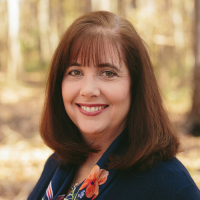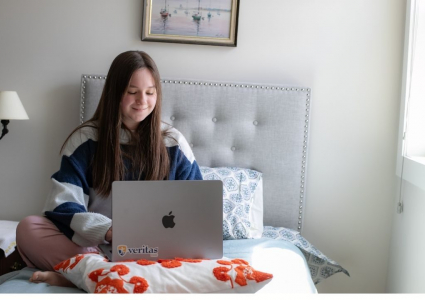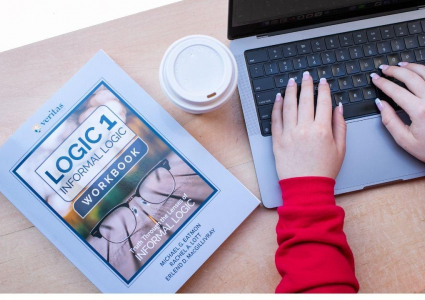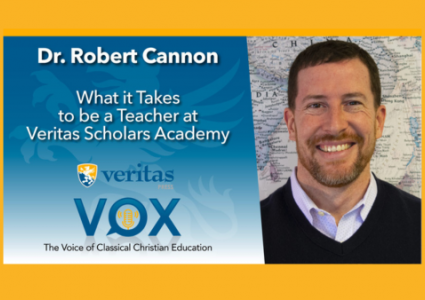How to Start With Veritas | Jenny Lindstrom
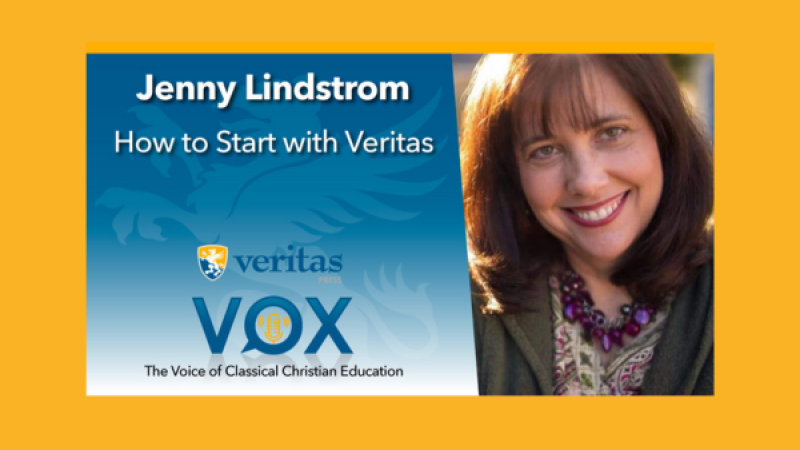
Listen on Apple Podcasts | Listen on Spotify | Watch the Video
What are Family Consultants and Academic Advisors at Veritas Scholars Academy? What do they do to help families with their children’s educational journey? Today, Family Consultant Jenny Lindstrom joins us as we dive into the practical elements of how we help families who are brand new to Veritas and classical education so that their kids are set up for academic success.
Episode Transcription
Note: This transcription may vary from the words used in the original episode for better readability.
Marlin Detweiler:
Hello again and welcome to another episode of Veritas Vox. Today I have Laurie with me to help host and of course, our guest is Jenny Lindstrom. Jenny, welcome.
Jenny Lindstrom:
Thank you. I'm happy to be here.
Marlin Detweiler:
Jenny has worked for Veritas for a long time as a Family Consultant, and that's what we're going to talk about today. And she's going to tell us a bit about what our Family Consultants do. But before we do that, Jenny, tell us a little bit about yourself.
Jenny Lindstrom:
Okay. I was born and raised in Fort Lauderdale, Florida. So I'm a true Floridian.
Laurie Detweiler:
So that’s why we get along so well.
Jenny Lindstrom:
That's right. You know, because Laurie's from Miami. I was I was born into a very large family. I have five older siblings. I'm the youngest of six. I went to parochial school for my entire life. I have older parents, so my parents retired when I was 16. So we moved to Ocala, Florida, where I finished my schooling.
I became a big avid softball player, so I ended up playing softball. I was the top pitcher in the state of Florida, played for the University of Florida.
Marlin Detweiler:
Fast pitch?
Jenny Lindstrom:
No, slow pitch. Back then it was slow pitch. Okay. But I was very accurate. Getting that arch up, that's very important.
So then I married my husband and we've been married 40 years. He was a nuke on submarines and he had just joined the Navy. We had met in high school, but we didn't start dating till college. Moved to Chesapeake, Virginia, of course, where the Norfolk Hub is for all the fast attack submarines. And so at that point, we had our first child, Jonathan, who is now almost 39 years old because we've been married 40 years.
So my husband was gone. My family was in Florida. So I wanted to be that stay at home mom with the child. That was very important to me. And I found out about Discovery Toys. So I know Laurie and I have talked about Discovery Toys, and I have a marketing background. So I decided that I would have my enthusiasm about sharing these amazing educational toys.
But I did it for 13 years and I was really one of the top sellers and recruiters in Discovery Toys. I earned nine trips all over the world. So in all of that time, I think it educated me on child's brain development. And I wanted the best education for my children. I ended up having our two sons.
We found classical education around sixth grade for Jonathan. And so there's a local classical school called Stonebridge. They use the principal approach. I'm not sure if you've ever heard of it. They were the model school for the Foundation for American Christian Education. And I was asked by the owner of the company or the school to be their first Admissions Director.
And so that's where I stepped into this role of admissions. And so I would say over 30 years, separate from Veritas, I worked in four different Christian schools, two classical, two non-classical, and I guess the last thing I would say is that we adopted two daughters from China when we were 41 and 42. So kind of starting all over again. In that time period, I did homeschooling for my now 33-year-old.
We homeschool for seven years. I continued to do classical homeschooling education and didn't know about Veritas, unfortunately. But we found Veritas not until my daughters were going into 10th grade. We had taken them out of the largest Christian school and they graduated from Veritas in 2021, which was a tremendous blessing that God brought us to Veritas before COVID.
Marlin Detweiler:
How did you find Veritas, Jenny? We've known each other for longer than that.
Jenny Lindstrom:
Five years. Yeah.
Marlin Detweiler:
Okay.
Jenny Lindstrom:
And basically, my girls were going to a small homeschool program. It was called WMV, Young Musicians of Virginia. And so one of the moms in the office, I just had asked, you know, has anybody heard of any online programs? I needed more of an academic challenge than just the homeschooling because the girls needed the challenge and somebody recommended Veritas and one other school.
I wanted classical. And so that's when I made the call. I spoke to someone at the school and decided to step back into a role working for Veritas. So that's when I talked to Tricia Williams and she invited me to Lancaster.
Laurie Detweiler:
Yeah, I remember that trip!
Jenny Lindstrom:
Yeah, I do remember meeting Bob and discussing me becoming an Academic Advisor. And I went through tremendous training with Michelle Langley, and I did that for a year. But on the side I was doing these prospective calls coming in, and I felt like that was my niche. That is what I love, talking to these families, sharing my enthusiasm about classical education.
And so here we are today. And then the two girls they both applied to four colleges each, they're very different students. One's the overachiever. One is a hard-working student. Both graduated with five point codes and they both got full rides at every college they applied to. So one is at Hillsdale.
Marlin Detweiler:
That's wonderful.
Laurie Detweiler:
One of the things that's been so helpful for I think families you work for is the background that you have and that your children came to us late because we're finding that more and more often now that families are hearing about us, their children are in junior high or high school, and they're just wondering, “How in the world in my ever going to do this?” and because you've done it, you know how it is to help a family walk through that process.
Marlin Detweiler:
Yeah. We've started the idea of a Family Consultant, only in 2022, maybe 2023. That's a role that you have filled and filled well. Tell us how we use the term, what it means for you to be a Family Consultant.
Jenny Lindstrom:
So a Family Consultant is talking to, first off, prospective families that are looking for something of an education to homeschool. Either they're leaving public schools, private school, or they're avid homeschoolers. They're either avid in already understanding classical education. But a lot of times my role is educating them from the very beginning. What is classical education? What is different about classical education versus if they were going to a brick and mortar school using Abeka or Bob Jones or other curriculums? What's the difference? And talking about the Trivium and just basically educating. And then we go into our consultation servicing the part-time families, and that would mean helping them enroll, helping them by creating an academic plan, which of course me being an Academic Advisor for a year, that served me very well because I understood what was necessary either for the diploma program or for the flexibility of a part-time student.
Marlin Detweiler:
You're using some terms that I want to make sure we define. One is a part-time student. And then you mentioned a diploma family. So let's define. Tell us what you mean. I know, of course, but I want you to do that. What we mean by a part-time family.
Jenny Lindstrom:
So a part-time family is somebody who is either purchasing our curriculum and they're using our curriculum using our Self-Paced courses, taking live classes. But it could be one class or even a part-time student could take five or six live classes. But the parent is actually not enrolling them in our fully accredited school. They're just enrolling them in our classes.
So the parent will then take the grade in which the child earns and put it on their homeschool report card or transcript. Now, some families supplement, so they do a little bit of this over here. They're part of their co-op, and then they maybe supplement because mom doesn't want to teach math or science.
Marlin Detweiler:
Or Logic or Rhetoric!
Jenny Lindstrom:
Right. But there are a lot of people that come to us that don't understand why do we take Latin? What is Rhetoric? You know, there's a lot of educating. I feel like that's my role primarily is educating and equipping parents to help them make their decision, empowering them. So what is the Diploma Program?
That is our fully accredited school. And so I love it because I see the huge benefits of a program like this. There are three top accreditations in the United States. I've learned a lot over the five years. So MSA is one of the top accreditations.
Marlin Detweiler:
Middle States Association or Middle States, and we're accredited.
Jenny Lindstrom:
That's right. And so most of them use ACSI, which is an average Christian one. It's not a bad one. But if you want your child to go into the Naval Academy or Ivy League or State University having on that transcript Middle States Association is huge. So, of course there are requirements in the fully accredited Diploma Program. When you enroll, you pay a fee yearly, and then you are assigned an Academic Advisor. And then that advisor creates an academic plan all the way through 12th grade. So I know the comparison of, say, when I worked in a private school, even in high school, they would only do one year at a time when they did academic planning. So it's quite unusual to have a school that will plan and look at the college dual enrollment or customize. So, with the Diploma Program, they're actually getting a physical transcript that is accredited that will go directly to the university from our institution. It is not a homeschool.
Laurie Detweiler:
One of the things you said, Jenny, that I think is so true about Veritas is, and this is always been in my heart, and where I think Marlin and I have tried to lead things is we look at each child as an individual. This is not a cookie-cutter approach. We have all different ways that you can do Veritas. But even in our Diploma Program, you know, you take a family, and you get them set up and you start their academic plan for them helping them transition. But then each Academic Advisor is looking at that student as an individual and what's best for them. And so what you know is best for even your two girls. It was very different for them. Yes. And I think that's one of the things I love about Veritas is flexibility. With size comes the ability to have flexibility. One of the things I hear the most from parents is I can't believe all the options you have. Well, yes, we're large enough now that we can offer lots of different things.
Jenny Lindstrom:
Yes, and when I go into a consultation, that's what I focus on. Laurie is the customization of a student that might be two or three years behind in math. How can we move them forward a little quicker to get caught up? Or maybe they're reading level isn’t a sixth-grade reading level, so we might need to start them in a fourth-grade reading level, which we can. And then a regular brick-and-mortar school or even some of the other – I've looked into other online classical schools. The big difference is they put all children in a box. So all sixth graders, all eighth graders, all 10th graders are all in the same typical courses, unless they're advanced in math or below in math.
Marlin Detweiler:
And that's not best for the student.
Jenny Lindstrom:
Correct.
Marlin Detweiler:
Jenny, we have what are called Family Consultants, and we have Academic Advisors. And with a Family Consultant, someone listening could go to our website or call our phone number to sign up for a consultation, and that's when they would meet someone like you or one of your peers, of which there are many now, many Family Consultants to get started to ask basic questions all the way up to getting enrolled.
So talk to us a little bit about the process that somebody might do to start and then talk about where the handoff is and how the relationship between Family Consultants and Academic Advisors works and what Academic Advisors and what Academic Advisors end up doing for the families as well.
Jenny Lindstrom:
Okay, I can do that. So when I receive a lead, we basically, someone that has an interest, they fill out a consult form, and then we’re randomly assigned that lead.
Marlin Detweiler:
The consultation forms are found on our website, www.veritaspress.com/consult
Jenny Lindstrom:
So the first thing we typically do is send an email to them with our calendar because we're constantly booked. I talked to 13 families yesterday, so we're constantly. Yes. So they will get on my calendar, or they'll say, Jenny, your calendar is full. So I’ll fit them in. So then, when we meet with them, I think the beginning is asking the questions.
My role is to ask a lot of questions, get to know who they are. Who are we going to talk about today? Where do you live? What is the background? Are they coming from public school, private school, or homeschooling? What curriculum did they use? What kind of student do you have? Are they competitive in sports? We need to get to take in that information so we can then go into the understanding of customizing.
But I make sure that in every consultation, I explain you have choices and there's two major options: part-time or full-time, which is what I just explained to you. So I make sure that every family before they get off the phone, they understand, but they may say, we want to just start part-time. We just want to try one live class.
So we go from there and we talk about the different curriculums and how that works. If they decide “We’re interested, we want a diploma plan, we want a transcript, we want our child to graduate because our best friends over here told us how wonderful there is.” So then what we do is then, I put an academic plan together.
So I ask them lots of questions. We talk about their math. If they need, we'll do a placement test. But typically we can look and see what they're actually currently doing, how well they're doing in that math. If they're in pre-algebra, I'll say, “Okay, are they a strong student?” If they're doing it doesn't matter if it's Saxon or Math-U-See or Singapore, if they're ready for Algebra one, then we'll put them in our Jacobs Classical math.
Typically, I have to explain what is classical math. So then we'll talk about that. Okay. So then what we do is I create the academic plan with the requirements that Veritas has, but customizing for that student. So for example, if they're not a strong reader and they read maybe two or three books, they might not be ready for Omnibus.
So, we have transition classes. Then we have the ferocious readers, that kind of seventh grader going into Veritas could do Omnibus because they can read that many books. They're capable. So, we want to set them up for success. We want that. We don't want them drowning.
Laurie Detweiler:
By the way, Omnibus is our Great Books program, we'll throw that in!
Jenny Lindstrom:
Yes. I’m sorry.
Laurie Detweiler:
That’s okay!
Jenny Lindstrom:
I call it our signature in Veritas, it makes us stand out. We want our kids to be amazing readers. So, I think it's important that the family understands what makes Veritas unique in this Diploma Program. One is that all our high school classes are mostly all honors with a high GPA of 5.0. Most, 99% do not understand that. So we go through that, and they understand. Because they’re thinking, “Well, I know when I was growing up an A was a 4.0.” So, looking at a transcript, like for example, Hillsdale got my daughter's transcript, they called Veritas. It ended up being the vice president of enrollment at Hillsdale, and he wanted to know what in the world this program was.
And I told them I'd be happy to explain it. My daughter just graduated from there, and he was looking at her transcript and said, I've never seen a transcript like this in the history of my career. And so I said, “Why is that? How is that?” I knew the answer, but I wanted him to tell me. So he said, “We don't see 5.0’s. Are the parents teaching this?”
I said they're in the high school. We have these amazing teachers, 170 teachers, most all of them in the high school have master's and doctorates. So he's like, “Wow, this is mind-blowing.” And then, of course, they pride themselves on the Great Books. So we talked about Omnibus.
And when I told them how many books they read, he's like, well, “What kind of books?” So then I talked about Perlandra and you know, the picture of Dorian Gray and he's just like completely blown away. So I tell parents, giving these examples to parents. So in this consultation, they understand how unique Veritas is compared to other choices out there.
And so once I finish what I'm doing, then the family will then pay their Diploma fee. Okay. So when they pay the fee, I run that and then we choose an Academic Advisor. We schedule an appointment. Yesterday I scheduled an appointment within a few hours. And so it doesn't typically go that fast, but you can do it within 24 to 48 hours. You can meet with an Academic Advisor. You want your student to be part of that. It's a live meeting in a classroom, and they usually spend about an hour and a half with their new advisor.
Marlin Detweiler:
Academic Advisors for language that people are familiar with or a little bit like what we would have thought of as guidance counselors.
Jenny Lindstrom:
Yes, absolutely. And most all of them have had their kids at Veritas, not all, but most of all, they're very seasoned, so they're very familiar not just with the curriculum, but they're well-trained. And so they'll take the plan that I've created for the upcoming school year. And then they will then sit with them and work through all the way through 12th grade.
Now we have four tracks. We have the Associate track, the Standard track, the Honors track, the Highest Honors. Of course with Honors and Highest Honors, they need to come in at seventh grade because of the requirements of that. Basically, the Associate track is very flexible.
We have kids that are planning to major in engineering, and then there's kids that are, you know, more want to go to law school. They just want to take Rhetoric I, Rhetoric II, Senior Thesis – that Academic Advisor is going to make a plan through 12th grade and focus on what the interests are of the child.
Marlin Detweiler:
It should be also said that not every seventh grader knows what they want to do or might change their mind. And the flexibility that you mentioned earlier is important to realize and comes into play there.
Jenny Lindstrom:
Absolutely. And they can start on one track and change to another track down the road. It's better to start higher and then move down. Because you can't start lower and then jump up on the honors track. So the the Academic Advisor goes through all of that hand-holding. They're available for that family all year long.
So if the family is struggling with the online new program of online schooling, balancing, you know, the amount of work and classes and so forth, the Academic Advisor can be very helpful to come alongside and encourage if something changes in a child's schedule like they're in a sports and they need to change a class to a different section time, the Academic Advisor will do that for them.
Laurie Detweiler:
That's one of the things I think I learned yesterday, Algebra I, I think has 21 sections this year. So when I say we have time and flexibility, I mean this year we added an entire, what I call nighttime section for people that are on a different continent. And so it's a whole different thing.
Marlin Detweiler:
I think I've said this before, but my dream is to be able to or need to offer classes literally 24 hours a day to meet all the time zones. And, of course, the southern hemisphere. Many of the English speaking countries in the Southern Hemisphere.
Start their school year in late January or early February. And so the idea of having a separate school year start and end is also on the horizon, we think. And so that plays into really how you work. Do you have a busy time? Do you have a time that slows down? How does your work day look? I think I know the answer to this too well.
Jenny Lindstrom:
Well, I think there used to be an ebb and flow, but now we have an amazing Vice President of Marketing who keeps us very busy these 12 months out of the year. And so I wouldn't say I have a slow time, primarily because I'm up to 4,000 families that I've serviced. Some have gone on to Diploma. I think I've enrolled about 1,200 students in Diploma in four years. And so there's still a lot of those part-time. I was having three parents last night ping me even at 10:00 at night because they might be in California. “Jenny, we want to enroll in Diploma. Do have time? Your calendar is full.” So I fit them in sometime today, and we'll make it work.
Laurie Detweiler:
Show up at graduation and go, “That's one of mine!”
Jenny Lindstrom:
And the relationship building is the most important. And I will tell you what makes Veritas what we have to talk about this. There are two major, big things. Number one is the uniqueness of that classroom environment where you have this teacher who doesn't just have high degrees, they have experience, they have passion for what they're teaching and that given subject.
And that comes across in the classroom. So you have a teacher that's highly skilled, very excited about working with high school students, very seasoned. But then you have students in that classroom all around the world. So that's one of my greatest joys. Yesterday, I've been working with a family for four years. They're in England, and so dad's a pastor, and so their oldest is graduating actually from Veritas. But they have three in Diploma. The youngest one is not. So she contacted me to talk about, okay, he's going into I believe it was seventh grade and we talked about an academic plan and for the part-time student, and then they plan on doing the diploma for ninth grade. They're waiting just because they're over in England, and it works for them.
Marlin Detweiler:
Yeah, that's understandable. Well, one of the things I want to make sure people know, too, and I know you deal with them, is that we're encouraging people to be full-time, part of what we call the Diploma Program in grammar school, though we call it I forget the term that we use, you might be able to help there, but we love the idea of students being full-time in the 7th through 12th-grade years because it sets them up for success best and because it's kind of a seal of approval to make sure they're doing enough. Not too much, but not too little. It's really a way of making sure that they're pacing their children in an effective way. And we love the ability to work with people in an accountable structure like that. Even in the early grammar school years.
Have you found that helpful?
Jenny Lindstrom:
Absolutely. And I have story after story after story of talking to thousands of families that I have enrolled in the grammar school, even kindergarten. A family who's never homeschooled. They don't they don't have a clue. But this is what they felt God was calling them to do for one reason or another. They're going to homeschool, but they want accountability. They want someone to handhold them. They want the direction.
Laurie Detweiler:
They like the feedback that they get. A lot of people don't realize it, but in grammar school there's a lot more flexibility because we know moms want to teach their children, and they might not want them online all day. And so you have the ability to teach your children and upload work that we give you feedback on. And so it's a little bit different in grammar school.
Jenny Lindstrom:
Absolutely. I think, especially like there's one family I've worked with for years now, a military mom. They moved to Japan, so I enrolled them with a kindergartner in the Diploma Program. And so they did the diploma program for, I believe, one year. But then when they got on this base over there, she left the Diploma Program and did another homeschool program.
I won't mention it, but we're all familiar with it. And so they did the group thing for about two years. She reached back out to me. She goes, this is driving me crazy. It's not structured. I want my kids back in Veritas. So, I'm putting two in the Diploma Program. So one came in in kindergarten, one came in in second grade.
And so we're friends on Facebook. So she's always reaching out to me with just what the kids are up to. But they love the Diploma Program. They're working with Susan because Susan was their original Academic Advisor, and they're just moving back to the United States. This actual month. So it's very exciting to see those grammar school mamas that really appreciate the value that the Diploma Program brings to that structure, that wisdom that's coming through with that Academic Advisor.
I also want to say I have had many families that come into Veritas. They didn't do a consult, and enrolled their kids never having classical education– sixth grade and either bought a package and got all sixth grade level curriculum and they put them in all these live classes, and then they're struggling.
Marlin Detweiler:
That's where talking to you or one of your peers pays so much dividends because families can avoid the frustration and difficulty from somebody who can guide them the whole way through. Jenny, thank you so much for your time today.
Jenny Lindstrom:
You’re welcome.
Marlin Detweiler:
We are so excited about what you and your team have added to what we're doing. It's great to visit with you.
Jenny Lindstrom:
Well, thank you so much for having me.
Marlin Detweiler:
You bet. Folks, thanks for joining us on this episode of Veritas Vox of Hope to see you next time.



